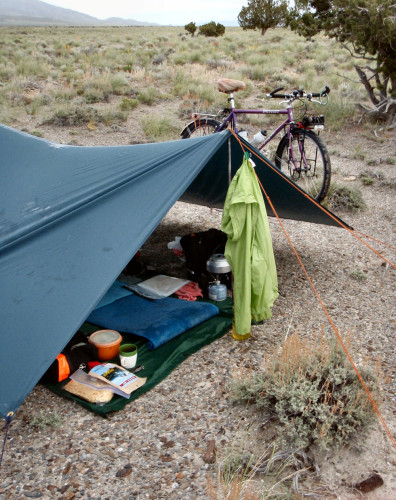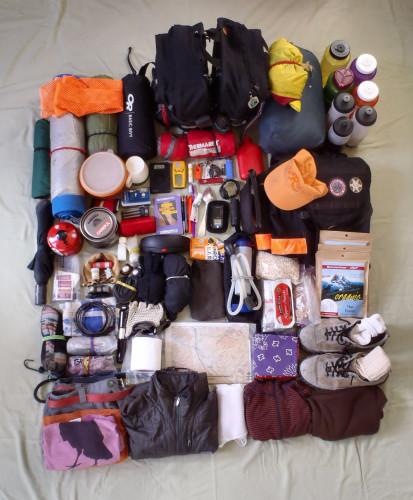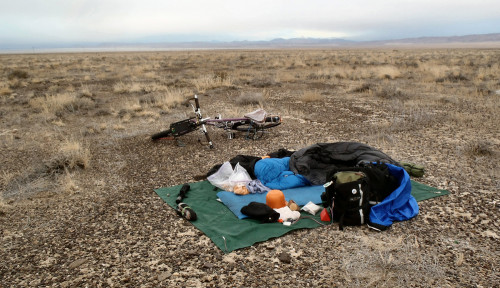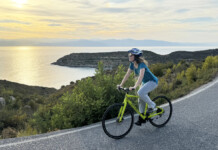By John Roberson
What do you need to pack for a long distance bicycle tour?
John Roberson’s List of Stuff to Bring on a Bicycle Tour
After many, many years of bicycle touring, I’ve come up with my own basic list of gear that I use when I prepare for a trip. My list has five basic categories: camping gear, clothing, food, tools and personal items. Please know that I’ve never taken everything on the list, but most of what’s there goes with me on every tour.
Like a lot of folks here in Utah, I should begin by saying that I really like to ride my bicycle. I enjoy using my bicycle to get around, and I ride for lots of different reasons. I ride a bike to and from work, and when I’m doing my around-town chores. I like that it’s easy on both the atmosphere and my wallet, and that it helps keep me healthy and fit. It’s nearly always a lot of fun, too!
Cyclists everywhere realize that a bike allows them to move around at an efficient pace while simultaneously giving all their senses a wonderfully direct connection to the environments they experience as they ride. By riding our bicycles we can literally smell the flowers as we ride.

As any savvy traveler knows, it’s usually a good idea to be well prepared before heading out on a trip. Bicycle tourists know this, too, and we know that some circumstances require a higher level of preparedness than others. For example, an extended, self-supported mid-winter tour of the Colorado Plateau would seem to call for more thorough planning than a short, credit-card-oriented summer cruise through Utah’s northern valleys. There’s a lot to think about when planning a trip, but sensible touring bicyclists always consider the weather and temperature, the season and terrain, the company they will be keeping and the availability of resources along the way. I have found that being well-prepared minimizes unnecessary stresses and allows me greater freedom to relax and enjoy the journey.
Many bicycle tourists start the trip planning process with some kind of a list. If they have experience touring they probably have a list of their own. But if not, bike trip equipment lists can be found in abundance on the Internet and in some of the excellent guides to the state that are available. (I strongly recommend Dennis Coello’s 1984 classic BICYCLE TOURING IN UTAH.) No two lists are exactly alike, but they all have a great many things in common.

After many, many years of bicycle touring, I’ve come up with my own basic list of gear that I use when I prepare for a trip. My list has five basic categories: camping gear, clothing, food, tools and personal items. Please know that I’ve never taken everything on the list, but most of what’s there goes with me on every tour. It all depends on the time of year, the length of the tour, the riding conditions or whether I’m riding alone or with friends. Everything I take fits into front and rear panniers or rides on top of the front and rear racks. Other than the clothing I wear, I carry nothing on my person. My total load (bike and gear) generally weighs between 70 and 90 pounds when I first start out.
I print up a fresh copy when I begin planning each trip and add notes to it as I go. It isn’t perfect, by any means, and I usually make some slight change to it after every tour, but overall, it really works quite well for me. The list below has a few notes attached for the reader’s benefit and is missing a few of the more personal items on my own list. Otherwise, it’s good to go. Enjoy!
Camping Gear
shelter: a tarp tent or small tent with fly
ground cloth
sleeping bag and a waterproof bivy sack
pads: a full-length, closed-cell pad and a tiny, self-inflating Thermarest pad
water bottles: 3 on the bike frame and 2 to 4, 1-liter bottles in my panniers
water filter
small thermos (especially nice in hot weather!)
stove, fuel canister(s) and lighter
small kettle
small, sealable Tupperware bowl and lid
insulated drinking cup and spoon
pocket knife
dish soap and sponge
dish towel
lots of spare Ziplock-type bags of varying sizes
candle or night light (for camp zone ambiance!)
headlamp (task lighting)
a simple GPS for marking camp sites (and relocating old ones!)
Clothing
rain cape (or rain jacket)
cap with a brim
cool-weather cap and gloves
comfortable shoes, flip flops
spare socks and undies
handkerchiefs/bandanas
baggy cotton shorts with lots of pockets
padded riding liners
shirts: cotton, wool; short and long sleeved
riding “tights”, long johns
wool vest and sweater
neck gaiter
cycling gloves
snow gaiters
down or synthetic-fill jacket
windbreaker
high-visibility safety vest
Personal Items
sunscreen & bug dope
small camera, batteries, tripod, lens paper
monocular, hand lens
radio or MP3 player & tiny speaker (for campsite use only!)
phone
spare batteries
medicines/supplements/first aid
toothpaste & brush; TP; personal hygiene items
money, credit card, ID
pencil & notebook
maps & see-thru case, highlighter, waterproof pen
addresses, stamps, postcards
sunglasses, wristwatch
small book
Food
java, filters, tea bags
instant oatmeal, dried fruit & nuts
bulk soups
freeze-dried meals (I love the MaryJane’s brand!)
energy bars, chocolate, apples
olive oil, dried salami, hard cheese
“trail” mixes: fruit, nuts, rice crackers
spices: salt & pepper, herb mix, Spike
crackers, bagels
tinned or packaged fish: sardines, tuna, herring
whiskey!
powdered drink mixes
trash bags
Tools
spare tubes, spare cables, patch kit, tire levers
reliable air pump and CO2 cartridges
light-weight cable lock
chain tool
basic wrenches & hex keys
a few cable ties
small Vicegrips
chain lube & rags, latex gloves
duct tape, wire, spare bolts and washers
bungee cords
flashers (front & rear)
short length of line
seat cover
panniers (front and rear)
small stuff sack









